

SHABNAM'S PAGE FOR

Actually, it's for my English class, but whose complaining.
This page is under constant construction. Below are excepts pertaining
to the marginal concept of humanity as is shown in H.G. Wells' Island
of Dr. Moreau. Right now, check out this really neat page that I found
for
The Island of Dr. Moreau.
And this is what the critics have to say.



The Following Are Selected Extracts From The Novel:
DURING THE ADVENTURE:
A Description of M'ling-

"I did not know then that a reddish luminosity,
at least, is not
uncommon in human eyes. The thing came to me as a stark inhumanity."
(p. 18)
During his stay at the island, Prendick observed the unusual luminosity in
the eyes of the Beast People. This vision is repreated throughout the
novel to distinguish them.
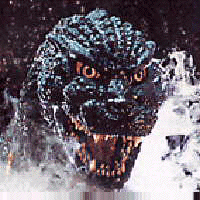

Prendick's Encounter with the Beast Men-
"I saw only their faces, yet there was something in their faces - I knew
not what- that gave me a spasm of disgust.... They seemed to me then brown
men, but their limbs were oddly swathed in some thin dirty white stuff
down even to the fingers and feet....there under peered out their elfin
faces at me, faces with protruding lower jaws and bright eyes. They had
lank black hair almost like horse hair, and seemed, as they sat, to exceed
in stature any race of men I have seen....their bodies were abnormally
long and the thigh-part of the leg short and curiously twisted. At any
rate they were an amazingly ugly gang...." (pp. 26-7)
In this passage, Prendrick describes the "curiously" formed creatures.
From the language that Well's uses (he employs words such as "amazingly"
and "oddly") and the depiction of the Beast People that he creates he
conveys Prendrick's surprise and his intuition concerning the abnormality
of these seemingly human entities.
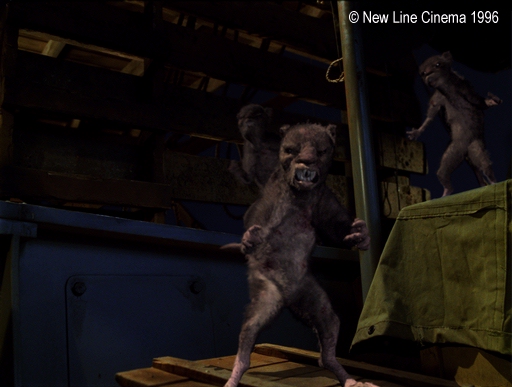
"...my thoughts went to the indefinable queerness of the deformed and
white-swathed man...I never saw such a gait, such odd motions...most of
them [Beast men] I had found looking at me...in a peculiar furtive manner,
quite unlike the frank stare of your unsophisticated savage." (p. 34)
In the excerpt above, Wells focuses on the duality present in the Beast
People - namely, their human and inhuman traits. Although there is an
"indefinable queerness" about them evident in their "gait" and "odd
motions", they still display striking similarities with humans such as
observing others in a "furtive manner" in order to not be considered rude.
Thus, due to the salient human features and behavior of these Beast
People, Prendick refers to them as "unlike...your unsophisticated savage".
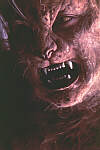 "Suddenly, as I watched their grotesque and unaccountable gesture, I
perceived clearly for the first time what it was that had offended me,
what had given me the two inconsistent and conflicting impressions of
utter strangeness and yet of the strangest familiarity. The three
creatures...were human in shape, and yet human beings with the strangest
air about them of some familiar animal. Each of these creatures, despite
its human form, its rags of clothing, and the rough humanity of its bodily
form, had woven into it, into its movements, into the expression of its
countenance, into its whole presence, some now irresistible suggestion of
a hog, a swinish taint, the unmistakable, mark of the beast." (p. 45)
"Suddenly, as I watched their grotesque and unaccountable gesture, I
perceived clearly for the first time what it was that had offended me,
what had given me the two inconsistent and conflicting impressions of
utter strangeness and yet of the strangest familiarity. The three
creatures...were human in shape, and yet human beings with the strangest
air about them of some familiar animal. Each of these creatures, despite
its human form, its rags of clothing, and the rough humanity of its bodily
form, had woven into it, into its movements, into the expression of its
countenance, into its whole presence, some now irresistible suggestion of
a hog, a swinish taint, the unmistakable, mark of the beast." (p. 45)
 Prendick's thoughts now seem to be more directed to the truth of the
Beast People. He realizes the eerie combination of human and animal
attributes in the islanders characterizing them with "utter
strangeness and yet of the strangest familiarity". he further
stresses this point in his contemplation of the issue: "[They were]
human beings with the strangest air about them of some familiar
animal. Wells is now concentrating on the inhuman, animal-like traits of
the Beast People who are seemingly human by adding an important detail in
describing their presence: "the irresistible suggestion of a hog, a
swinish taint, the unmistakable, mark of the beast".
Prendick's thoughts now seem to be more directed to the truth of the
Beast People. He realizes the eerie combination of human and animal
attributes in the islanders characterizing them with "utter
strangeness and yet of the strangest familiarity". he further
stresses this point in his contemplation of the issue: "[They were]
human beings with the strangest air about them of some familiar
animal. Wells is now concentrating on the inhuman, animal-like traits of
the Beast People who are seemingly human by adding an important detail in
describing their presence: "the irresistible suggestion of a hog, a
swinish taint, the unmistakable, mark of the beast".
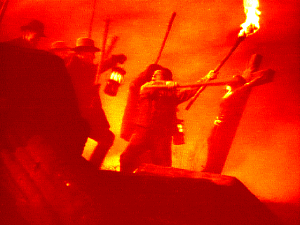
Sayer of the Law ("the Law...battled in their minds with the
deep-seated, ever rebellious cravings of their animal natures." p. 92) -
"Not to go on all-Fours; that is the Law. Are we not Men?
Not to eat Flesh or Fish; that is the Law. Are we not Men?
Not to claw Bark of Trees; that is the Law. Are we not Men?
Not to chase other Men; that is the Law. Are we not Men?" (p. 65)
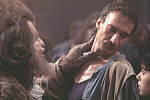
This chant that is repreated as a motif throughout the book imparts Dr.
Moreau's attempt to make his creations as human as possible- by confining
them to certain social conventions that distinguish humans from animals.
It is interesting to observe the question "Are we not Men?" after each
stated law since the end of the novel answers the inquiry. The message
that Wells intends to impart to the reader at the end of the novel deals
with the futility of trying to defy the laws of nature - that is, of
trying to transform a savage beast into a civilized human being. This
is because "the deep-seated,ever rebellious cravings of their animal
natures" override the teachings that Moreau instills in them concerning
civility.
Prendick's Assimilation-
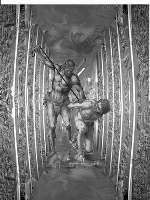
"I say I bacame habituated to the Beast People, that a thousand things
that had seemed unnatural and repulsive speedily became natural and
ordinary to me...I would see one of the bovine creatures who worked the
launch treading heavily through the undergrowth, and find myself trying
hard to recall how he differed from some really human yokel trudging home
from his mechanical labors..." (p. 96)
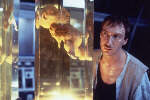
After living with the islanders for a considerable amount of time,
Prendick finds himself so accustomed to the Beast People ("things that
seemed unnatural and repulsive...became natural and ordinary to me") that
he does not seem to recognize the difference between them and real
humans. The comparison that he between the "bovine creature...treading...through
the undergrowth" and the "human yokel trudging home" stresses his oblivion
but at the same time, the juxtaposition of such similar images suggest the
commonalities between humans and animals.

"I, too, must have undergone strange changes. My hair grew long, and
becane matted together...my eyes have a strange brightness, a swift
alertness of movement. (p. 146)
This passage was obviously constructed to demonstrate the similarities
between humans and animals for Prendick is presented with the same
luminosity in his eyes that he found conspciuous in the Beast People.

DELUSIONS FROM HIS RETURN:
"I would go out into the streets to fight with my delusion, and prowling
women would mew after me, furtive craving men glance jealously at me...it
seemed that the preacher gibbered Big Thinks even as the Ape Man had done;
or into some library, and there the intent faces over the books seemed
but patient creatures waiting for prey....it seemed that I, too, was not
a reasonable creature, but only an animal tormented with some strange
disorder in its brain, that sent it to wander alone, like a sheep stricken
with the gid." (pp. 155-6)
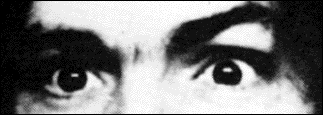
This passage highlights the delusions that Prendick experiences: the
"craving glances of the men", the preacher gibbering the same
incomprehensive language as the Ape Man, and the individuals stalking him
in the library. These images share a common link - all the humans are
described with a tinge of animal like qualities. In addition, Prendick
finds himself possessing the same irrationality manifested in
lower-intelligence animals. What Wells is trying to impart to the reader
is that humans surprisingly can be compared to lower life forms and
the thought of this is as threatening as the delusions that Prendick
encounters.
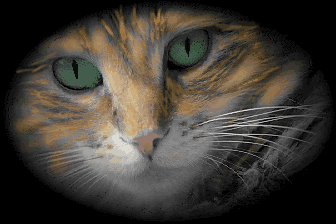
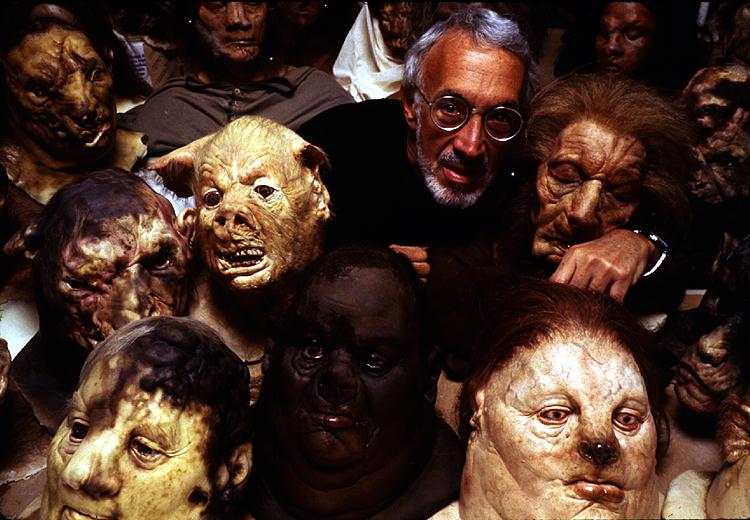
"I was almost as queer to men as I had been to the Beast People. I may
have caught something of the natural wildness of my companions.
...a restless fear has dwelt in my mind...I could not persuade myself that
the men and women I met were not also another, still passably human, Beast
People....and that they would presently begin to revert, to show first
this bestial mark...I look about my fellow men. And I go in fear. I see
faces.... none that have the calm authority of the soul. I feel as
though the animal was surging up through them; that presently the
degradation of the Islanders will be played over again on a larger scale.
I know this is an illusion, that these seeming men and women are indeed
men and women, men and women forever, perfectly reasonable creatures, full
of human desires and tender solitude, emancipated from instinct, and the
slaves of no fantastic Law - beings altogether different from the Beast
Folk. Yet I shrink from them, from their curious glances, their inquiries
and assistance, and long to be away from them and alone." (pp. 154-156)
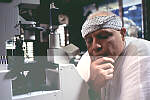
Once again, Wells is emphasizing the "bestial mark" in men. He delves
into the concept of reversion, explaining that the "degradation of the
islanders will be played over again on a larger scale", possibly in human
life. Although Prendick is aware of the illusion of people being "still
passably human, Beast People, he is so devestated by his experience on the
island that he lives in fear and "shrinks from them [peope]", reasoning
that the failed experiment might occur in reality as the evolution of man
may regress into savagery.


Care for some real neat
sounds?
videos?
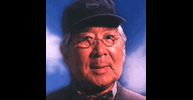
So, what did you think? Did you like it? I hope you enjoyed the
ride. I sure did. If you have any comments, suggestions, or if you are my
English prof and want to tell me that I'm getting an A, email me!

Shabnam Mansukhani
Thank you and goodbye.











 Prendick's thoughts now seem to be more directed to the truth of the
Beast People. He realizes the eerie combination of human and animal
attributes in the islanders characterizing them with "utter
strangeness and yet of the strangest familiarity". he further
stresses this point in his contemplation of the issue: "[They were]
human beings with the strangest air about them of some familiar
animal. Wells is now concentrating on the inhuman, animal-like traits of
the Beast People who are seemingly human by adding an important detail in
describing their presence: "the irresistible suggestion of a hog, a
swinish taint, the unmistakable, mark of the beast".
Prendick's thoughts now seem to be more directed to the truth of the
Beast People. He realizes the eerie combination of human and animal
attributes in the islanders characterizing them with "utter
strangeness and yet of the strangest familiarity". he further
stresses this point in his contemplation of the issue: "[They were]
human beings with the strangest air about them of some familiar
animal. Wells is now concentrating on the inhuman, animal-like traits of
the Beast People who are seemingly human by adding an important detail in
describing their presence: "the irresistible suggestion of a hog, a
swinish taint, the unmistakable, mark of the beast". 











